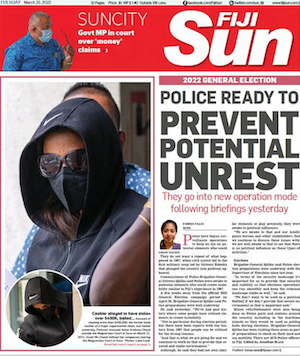By Michael Field of The Pacific Newsroom
Fiji’s police chief Sitiveni Qiliho looks to have dug out an old playbook that was used over a couple of years ahead of Voreqe Bainimarama’s 2006 coup.
Qiliho is on a shorter game plan though, he’s got to sow uncertainty and fear in Fiji’s population quickly — before the June general elections.
If he doesn’t, then Bainimarama and his Sancho Panza, Aiyaz Sayed-Khaiyum, will lose the elections and the likely winner will be 1987 coup maestro Sitiveni Rabuka.
At least that is what seems to show through the Fiji Sun’s recently heavily doctored opinion poll.
Today the Fiji Sun came out with this: “Police ready to prevent potential unrest.”
The one-sided slavish account of a ramble by Qiliho carried no details or names of those “elements” or what they might do. Other than to explicitly mention Rabuka.
Undoubtedly 1987 with its two coups — staged by Rabuka — was a disaster, but the unrest and uproar was not all his work. As we know now, Sayed-Khaiyum himself was one of the 1987 “elements”.
Arson investigative skills
Qiliho himself had arson investigative skills in another coup or two.
But the Fiji Sun left that out.
“We’ve had past history where some people have utilised elements to create instability,” Qiliho is quoted in the Fiji Sun as actually saying. “Not in particular during election period, but there have been reports with our history from 1987 that people can be utilised for the wrong reasons.”
Qiliho and the intelligence boys are planning countermeasures.

“We are awake to that and our intelligence bureau and other stakeholders that we continue to discuss these issues with, we are well awake to that to see that there is no political influence on those types of activities,” he said.
“In terms of the security landscape it’s important for us to provide that security and stability so that elections can run smoothly and keep the criminal landscape stable as well.
“We don’t want to be used as a political football if we don’t provide that secure environment so that is important now.”
Qiliho has a short memory.
‘Dirty politics at its worst’
Ahead of the May 2006 elections, which saw Prime Minister Laisenia Qarase reelected, Bainimarama was one of those “elements” that Qiliho now talks of. Bainimarama referred to “Mr Qarase and his cronies” and said Fijian politics was “dirty politics at its worst…it is cannibalistic.”
Qarase responded that Bainimarama’s “stated intention of involving the military in the national election campaign is a threat to peace and stability, and the conduct of free and fair elections. It goes against the rule of law and good governance.”
It would appear Qiliho – a military officer rather than a constable — is keen on getting 4576 police into the political game. What roll the 10,000 strong Fiji Military Force — the traditional leader of coups – is not spelt out.
In 2006 Bainimarama was explicit about the May elections and said that if the result was not to his liking, then he would act.
Has Qiliho with his piece today stuck his toe into the tub?
Michael Field is a co-publisher of The Pacific Newsroom. He is the author of Speight of Violence: Inside Fiji’s 2000 Coup. This article is republished with permission.
Article by AsiaPacificReport.nz








